Military to Civilian Resume Example for Veterans [Updated 2024]

Transitioning from a military lifestyle to that of a civilian is far from easy.
According to a Pew Research Center study, 95% of veterans seek employment after serving in the military.
26% of veteran respondents, however, found shifting from the military to the civilian lifestyle to be somewhat difficult.
Coincidentally, one of the biggest struggles for veterans is creating a compelling military to civilian resume that’s going to help them get a job that’s well-paid and enjoyable.
To help solve that problem, though, we wrote this guide. Read on to learn everything you need to know to create a compelling veteran resume, including:
- Military to Civilian Resume Example
- How to Write a Military Veteran Resume (8 Simple Steps)
- Free Military to Civilian Resume Template
- Essential (Free) Job-Search Resources for Veterans
In case you’re looking to brush up on the resume basics, watch the video below.
If you’re ready to get started, though, let’s start by reviewing a well-written military to civilian resume example.

Military to Civilian Resume Example (for Veterans)

Compelling, right? Here’s what the above military to civilian resume example does right:
- Follows a functional resume format. The functional resume format focuses more on your skills and strengths rather than work experience. It helps convey how your military experience is going to help you perform well in the civilian role you’re applying for.
- Lists the contact information the right way. It includes the applicant’s full name, email, location, phone number, and even a LinkedIn URL while skipping out on a photo.
- Captures the hiring manager’s attention with a resume summary. The summary on top of the military to civilian resume example offers a brief snapshot of the candidate’s career, instantly showing the recruiter their value.
- Focuses on transferable skills instead of work experience. Instead of mentioning military buzzwords that civilians wouldn’t understand in the first place, the resume example instead focuses on how the candidate's experiences helped them develop valuable skills.
- Mentions achievements when possible. Achievements help convince the recruiter that they’re not just any candidate - you’re an overachiever who plays to win.
- Uses bullet points to make the resume easier to skim. The recruiter doesn’t have all day - they have hundreds of other resumes to review just for a single role. Making the resume easy to skim makes it more likely to be read.
- Includes educational history (in brief). The military to civilian resume example describes the candidate’s educational background, which includes taking a leadership course and basic training.
- Makes use of the optional sections. The achievements and interests sections help shed light on the candidate’s personality outside of work, as well.
Now, let’s talk about how YOU can make your resume as impressive as the example above.
How to Write a Military Veteran Resume (8 Easy Steps)
In this section, we’re going to walk you through the 8 steps to creating a powerful military veteran resume, starting with:
#1. Pick a Functional Resume Format
These are the 3 most popular resume formats out there:
- Reverse-chronological . This format focuses on your work history over education or skills.
- Functional . It focuses less on your work background and more on your skills and how they make you a qualified candidate.
- Combination . This format is a mix of the other two formats. It puts equal emphasis on skills and experiences.
As a military veteran, you’re better off with a functional format .

As you can see above, the resume example focuses more on key strengths instead of just listing out work experiences.
This improves your odds of landing a civilian job for one important reason:
Most recruiters aren’t really familiar with military lingo.
Your experiences in the military might be super compelling, but chances are, most recruiters won’t understand how these experiences make you a good candidate for the role.
By framing your experiences around your skills, on the other hand, your resume becomes more understandable for a civilian.
Once you’ve decided on the format, you also need to sort out your resume style, layout, font, and more. Here’s what this includes:
- Don’t go over one page . Your resume should be concise and to the point. More often than not, if you’re going over one page, you’re probably including information that isn’t relevant for the role.
- Pick the right font and font size . In terms of size, go for 11-12 pt for body text. For the font, pick something like Ubuntu, Times New Roman, etc. That way your resume will look professional AND stand out at the same time.
- Use the military-to-civilian resume template . Want to skip the hassle of formatting a resume? Hit the link and pick from one of our free templates! Our templates are easy to use AND look much more compelling than the conventional black-and-white ones.

#2. Include Contact Information
Now that we’ve got the formatting hassle out of the way, let’s talk about resume content.
The first thing in your veteran resume is the contact information section.
Here, you need to include:
- Descriptive title. This should include your title in the military, as well as the title you’re applying for. Something like “Security Officer Seeking a Role as Customer Support Specialist.”
- Phone number.
- Professional email address. Think, [name][lastname]@gmail.com
- Location. City and state are good enough, you don’t need to include an address.
- (Optional) LinkedIn URL. If you have an up-to-date LinkedIn profile, you can include a URL in the contact information section.
And finally, make sure NOT to include a photo in your military to civilian resume. In the US, employers prefer that you don’t include a picture to avoid unconscious bias during the hiring process.
Here’s what your resume contact information section should look like at the end:
Security & Customer Service Professional
416-821-9879
Seattle, US
linkedin.com/in/john.doe
#3. Capture the Hiring Manager’s Attention with a Military Veteran Resume Summary
When reading your resume for the first time, the recruiter will spend roughly 7 seconds skimming it to make sure that you’re qualified for the role.
If the resume catches their attention, they’ll give it a more in-depth look.
If it doesn’t, they’ll simply move on to the next one.
This is where a compelling resume summary can come in handy.
A resume summary is a 2-4 sentence “summary” of your past work experience. It helps the recruiter understand your skill-set and whether you’re relevant for the role in a single glance.
Here’s what a convincing military to civilian resume summary looks like:
Dedicated professional with over 9 years of outstanding performance and results in the U.S. Military. Earned three promotions and excelled as a leader. Seeking to apply the skills I gained in the military as a Customer Support Specialist at Company X.
When writing your resume summary, make sure to include the following information:
- Your title in the military and the role you’re applying for.
- Years of experience.
- Top achievements and experiences.

#4. Summarize Your Experiences with a Key Strengths Section
This one’s arguably the most important part of your military to civilian resume.
At the end of the day, the main deciding factor in whether you get invited for an interview or not is if your resume manages to convince the recruiter that you’re capable of doing the job…
And that’s where the key strengths section comes in handy.
To create yours, start by listing out your top strengths as section headers. Then, underneath each header, list your achievements and responsibilities that prove you actually have the relevant skill.
Here’s what this looks like on a resume:
Customer Service
- Promoted within a short period by demonstrating an over-achieving dedication that maximized results for the entire team.
- Proved internal customer service by relating to all personnel in a professional manner that facilitated the development of a diversified group.
- Enhanced soldiers’ individual and professional growth, developing them into independent decision-makers.
- Accounted for the safety of equipment valued at over $1.3 million.
- Secure the personal safety, training, and performance of fifteen U.S. Army soldiers.
Operations and Administration
- Organized schedules for over 45 soldiers.
- Implemented new routes, resulting in savings in gas time and reduced work time.
- Prevented over 10 cancellations and negotiated over 20 contract renewals with the local government.
Applying for a Military or Private Security Role? Do This
Now, in case you’re applying for a role that’s somewhat related to your experience in the military (e.g. in private security), then you can simply create a conventional Work Experience section instead of Key Strengths .
If that’s your case, here’s how you should format the section:
- Create a section header called “ Work Experience .”
- Start by listing your most recent role and go backward in time from there.
- For each entry, include your title, company name, dates employed, and 3-5 top achievements.
- For older positions, you can include fewer achievements and responsibilities.
Now, if you want your work experiences to stand out from the rest of the candidates, we recommend you to include achievements over responsibilities.
- Achieved a 99.5% average delivery rate on all assignments, resulting in no losses of materials or assets.
- Conducted deliveries of materials and assets.
The first example shows just how the candidate stands out from other applicants. The 2nd, on the other hand, does not.
#5. Mention Your Education (the Right Way)
On to the next section!
The next step to creating a convincing military to civilian resume is mentioning your educational background .
This is where you mention your higher educational degrees, as well as training (e.g. boot camps) and any personal development courses you’ve taken.
First things first, here’s how you’d go about the formatting part:
- Create a header called “Education”
- Add your latest degree right on top. Then, include older degrees underneath.
- If you have a B.A. or an M.A., you can skip your high school degree altogether.
- You can skip mentioning a GPA. These days, no one cares about your grades.
Here’s how the end result would look like:
B.A. in Communications Boston University 08/2016 - 05/2020
Now, if you don’t have the relevant experience needed for the role you’re applying for, you can use your education section to show off your knowledge or skills.
You can do this by including:
- Any honors you might have earned.
- Exact courses you’ve attended.
- Any other way you’ve excelled during your education.
#6. Include In-Demand Skills (For the Industry You’re Applying for)
Another must-have of a military to civilian resume is the skills section.
This is where you list out all of your hard and soft skills and (optionally) grade them by knowledge level.
The key here, though, is not to simply list out random skills like:
- Critical Thinking
- Microsoft Word
Rather, you want to include the skills relevant to the role .
E.g. applying for a role in accounting? You should probably mention payroll tax accounting, cost reduction strategies, budgeting and forecasting , and so on.
You wouldn’t want to mention your Adobe Illustrator skills, for example (even if you’re an expert at it).
So, how can you know which skills are essential to your resume, and which ones aren’t?
The best way to understand this is to read the job ad you’re applying for. More often than not, they include an exact list of skills required for the role, and all you have to do is mention them in your resume (as long as you possess the said skills, of course).
#7. Take Advantage of the Optional Resume Sections
If you still have some space on your military veteran resume, you can take advantage of some optional resume sections.
While these sections won’t land you the job on their own, they can definitely help you stand out from other applicants seeking the same role.
Some optional sections you can include are:
- Projects. Any type of personal project you’ve worked on. This can be a local business you started, a side-gig, freelance work, and so on.
- Certifications. Any type of certification you might possess. If you don’t have the experience for the role you’re applying for, certifications can help show the recruiter that what you do have is the right skill-set.
- Volunteering Experience. If you’ve volunteered in the past, you should definitely include it in your resume. Employers love candidates who love to help others (even if there’s no monetary incentive for it).
- Hobbies & Interests. Including hobbies or interests in your resume helps the recruiter see more of your personal side. While your hobbies won’t land you the job, they might help you build rapport with the interviewer.
#8. Make Sure Your Military to Civilian Cover Letter is as Impressive as Your Resume.
At this point, your military veteran resume should be quite compelling…
But you’re not done just yet!
To have both a complete and compelling job application, you need to pair your resume with a cover letter that’s just as good.
Here are our top tips on how to write a quality cover letter :
- Start the cover letter by addressing the hiring manager directly. Sure, you could go with the default “Dear Sir or Madam,” but mentioning the hiring manager’s name shows that you’ve done your research and really care about working at the company.
- In your introduction, mention the most important parts of your background. E.g. years of experience, key achievements, top skills, and why you’re applying for the job in question.
- In the body section of your cover letter, expand on whatever you mentioned in the introduction. This is where you can also explain how the experiences mentioned in your resume make you a good candidate for the role.
- Conclude the cover letter with a call to action . E.g. “Looking forward to hearing more from you!” or “I’d love to discuss how I can help Company X as a Support Specialist over a call or an interview.”
Want to learn more? Check out our step-by-step guide on how to write a cover letter .
Essential Job-Search Resources for Veterans
There are a lot of free job-search resources for veterans on the internet - everything from dedicated job boards to free tools, programs, and more.
Here’s a comprehensive list of some of the very best resources:
Veteran Job-Search Resources
- Job board that helps you find federal organizations that prioritize hiring veterans over other candidates.
- Lots of quality resources to help you transition into civilian life.
- If you’re not sure what kind of career you want to focus on, you can use this website to discover different occupations and learn what they’re about.
- Website for finding veteran job fairs in your area.
- Free career consulting and job search help for veterans.
- American Corporate Partners matches you with a free, year-long mentor to help you build your career.
- For group discussions for veterans on resumes and gaining employment after service. (Veterans only/ screened and weeded out by questions and profile)
- For discussing Skill Bridge opportunities and military transitions. Skill bridge is a military program for giving veterans an opportunity to learn and work at civilian companies for 6 months before leaving the military.
- LinkedIn offers its Premium program to veterans for free for a year. You can use the platform to learn new skills, kick-start your career, as well as find and apply for jobs.
- A website dedicated to helping veterans transition into a civilian lifestyle. You can use it to find jobs, discover career events, attend job fairs, and more.
- Job board for US federal jobs. While it’s not specifically made for veterans, the US government prioritizes hiring veterans over other candidates.
- Job board for veteran-friendly roles and companies.
- Job board for roles in the private security industry.
- Another veteran-only job board.
Key Takeaways
And that’s all you need to know to create a strong military veteran resume!
Before you go, though, let’s do a quick recap of the key learning points we just covered:
- For a military to civilian resume, use a functional resume format to show off your skills instead of work history.
- Use a “Key Strengths” section to explain how your military experience distills into valuable skills for a civilian role.
- Don’t include every skill under the sun on your resume. Instead, pick the ones relevant for the role you’re applying for.
- Take advantage of the optional resume sections to show the recruiter that you’re an individual and not just a resume.
- Finally, make sure that your cover letter is just as impressive as your resume by following the tips we mentioned above.

To provide a safer experience, the best content and great communication, we use cookies. Learn how we use them for non-authenticated users.
- Career Blog
Military to Civilian Resume: Example, Template, and Pro Tips

When transitioning from the military to the civilian workforce, one of the most critical documents you need is a well-crafted resume. A military to civilian resume allows you to showcase your unique skills, experience, and qualifications that make you a valuable asset to any employer.
Creating a military to civilian resume can be a challenging task, especially if you have spent several years in the military. With this in mind, this article aims to provide insight, guidance, and tips on how to write an effective military to civilian resume.
In this article, we will discuss the importance of a military to civilian resume and provide examples and templates to help you get started. We will also offer professional tips and advice to ensure your resume stands out in a competitive job market.
Whether you are a transitioning veteran or a military spouse seeking to enter the civilian workforce, this article is for you. Keep reading to learn how to translate your military experience into a compelling civilian resume.
Understanding the Transition
Transitioning from military to civilian life is a challenging experience that requires careful planning and preparation. Military personnel face unique challenges when they return to civilian life, such as finding new employment opportunities, adapting to a new work environment, and adjusting to civilian culture.
One of the most crucial aspects of transitioning to civilian life is crafting a well-designed resume. This document serves as a critical tool for military personnel in their job search process. It needs to showcase skills, education, and experience in the most attractive way possible.
However, military and civilian resumes differ considerably in their structure and content. Military resumes tend to be more detailed and include military-specific terminology that may not make sense to civilians. Hence, it’s vital to create a tailored resume that can help recruiters and hiring managers understand the transferable skills and experience one possesses.
Another challenge that military personnel face is understanding what non-military workplaces would look like. Employers in the private sector may have different expectations and work cultures. While military service is highly respected and valued, the language, rank structure, and acronyms used within it differ from non-military workplaces.
Therefore, it is essential to create a well-crafted resume that highlights transferable skills and soft skills. Retirees or recent military veterans must be aware of their unique value proposition and the qualities that they can bring to a prospective employer.
Transitioning from military to civilian life is a significant life-changing event that takes time and effort. For military personnel, crafting a well-designed resume is the key to securing a civilian job role. Knowing the unique challenges that they will face during this transition will better equip them to succeed in their job search. It is vital that military personnel understand the differences between a military and civilian resume to tailor it effectively based on the skills learned in their service.
Identifying Transferable Skills
Transferable skills are abilities and knowledge that can be applied in various scenarios, regardless of the industry, role or job function. They are typically acquired through previous work experience, education or life experiences. The majority of transferable skills are soft skills, such as communication, leadership, problem-solving, and time management but can also include hard skills, such as technical proficiency.
Identifying transferable skills is an essential step for those transitioning from military to civilian careers. To determine transferable skills, examine both the technical and soft skills that you employed in your previous role. Start by reflecting on your daily work routine, listing your duties and responsibilities, and identify the skills you utilized. Then explore how these skills could be applied in a new industry or position.
To identify your transferable skills, start by following these steps:
Evaluate your military experience: Focus on the skills you applied in your military role, and assess how they could potentially be applied outside the military sector.
Analyze job descriptions: Review job descriptions in civilian roles you are interested in and compare them to your current military job requirements. Identify any overlaps or similarities in skills.
Consider your achievements: Think about your accomplishments in your previous military role, what skills did you use to accomplish them, and how could you apply these skills in a new role?
Conduct informational interviews: Speak with individuals who work in the industry or role you are interested in, ask about their job duties, and what skills they feel are critical to their success.
Some examples of transferable skills include:
Leadership: Managing a team, supervising colleagues or coordinating projects.
Communication: Effectively conveying information, negotiating or managing conflicts.
Problem-Solving: Analyzing data, creating strategies, and making complex decisions.
Time Management: Prioritizing tasks, managing schedules, and meeting deadlines.
Interpersonal skills: Cooperating with colleagues, demonstrating empathy and active listening.
Technical proficiency: Programming, information technology, and other specialized skills.
Transferable skills are abilities that can apply to multiple industries, roles, or job functions. Identifying your transferable skills is a critical step in your military to civilian career transition. By evaluating your military, analyzing job descriptions, considering your accomplishments, and conducting informational interviews, you will develop a clear understanding of the transferable skills required to succeed in a new role. Ensure that you highlight your transferable skills in your resume, cover letter, and during interviews to increase your chances of a successful military to civilian career transition.
Military to Civilian Resume Example
If you’re a veteran looking to make a transition into the civilian workforce, crafting a compelling resume is one of the most important steps you can take. However, making the transition can be daunting, as the terminology and priorities in the military differ from those in the private sector. Below is a step-by-step guide to creating a military to civilian resume, along with tips on how to use military-friendly language and an example resume to inspire your own.
Step-by-Step Guide to Creating a Military to Civilian Resume
Translate your military experience: Start by translating your military experience into civilian terminology. Focus on your key job functions and accomplishments that demonstrate your leadership, discipline, and problem-solving skills.
Use simple language: Avoid using military jargon or acronyms that could be confusing to someone outside of the military. Instead, use simple, clear language that anyone can understand.
Highlight transferable skills: When listing your experience, be sure to highlight transferable skills that will be relevant to the civilian job you’re applying for. For example, if you have experience managing a team, that could translate to a civilian management position.
Quantify your achievements: Use data and numbers to quantify your achievements wherever possible. For example, if you were responsible for managing inventory, include information on how much inventory you managed and how you improved the process.
Tailor your resume: Tailor your resume to the job you’re applying for by emphasizing the skills and experience that are most relevant to the position. Use the job description as a guide to help you choose which skills to highlight.
Military-Friendly Language to Use in the Resume
- Use action verbs that demonstrate leadership and initiative (e.g. managed, led, supervised, initiated, organized)
- Mention relevant training and certifications, such as leadership training, security clearances, or technical certifications
- Use terminology that is familiar to civilians (e.g. “team” instead of “squad,” “budget” instead of “funding allocation”)
- Emphasize the results of your work and the impact you had on your team or organization
Example of a Military to Civilian Resume
Below is an example of a military to civilian resume that demonstrates the tips outlined above. This is just one possible format; be sure to tailor your resume to your specific experience and the job you’re applying for.
Name: John Smith Contact Information: (555) 555-5555 | johnsmith.
Military to Civilian Resume Template
When transitioning from military to civilian life, creating a resume that can effectively showcase your skills and experience can be challenging. That’s why we have created a comprehensive military to civilian resume template to guide you through the process.
Overview of the Template
Our military to civilian resume template is designed to highlight your accomplishments and transferable skills in a clear and concise manner. It is formatted to be easily scannable by hiring managers and ATS systems. The template includes the following sections:
- Contact Information
- Objective Statement
- Summary of Qualifications
- Professional Experience
Tips for Customizing the Template to Fit Individual Needs
While our military to civilian resume template is a great starting point, it’s important to customize the template to fit your individual needs. Here are a few tips for personalizing your resume:
- Use keywords and phrases that are relevant to the job you’re applying for
- Quantify your accomplishments whenever possible
- Focus on the skills that are transferable to the civilian workforce
- Use clear and concise language
- Keep your resume to one or two pages
Section-by-Section Breakdown of the Template
This section includes your name, phone number, email address, and physical address. Make sure your contact information is up-to-date and professional. Avoid using nicknames or unprofessional email addresses.
Your objective statement should be tailored to the job you’re applying for. It should be a brief statement that highlights your qualifications and career goals.
This section is where you can showcase your skill set and achievements. Focus on transferable skills that are relevant to the job you’re applying for. Use bullet points to make this section easy to read.
In this section, you will list your work experience in reverse chronological order. Include the job title, company name, location, and dates of employment. This is also where you can showcase your accomplishments and how they relate to the job you’re applying for.
List any relevant education and training you have received. Include the school name, degree or certificate earned, and dates of attendance.
Use this section to highlight any additional skills you have that are relevant to the job you’re applying for. This can include language proficiency, technical skills, or certifications.
By following our military to civilian resume template and customizing it to fit your individual needs, you can create a strong resume that highlights your skills and experience. Don’t forget to have someone proofread your resume for errors and clarity before submitting it to potential employers.
Pro Tips for Military to Civilian Resumes
Transitioning from military service to a civilian job can be challenging. Military veterans, especially those who have spent many years in service, often have difficulty converting their military experience into civilian terms. One of the most important steps in this process is creating a military to civilian resume that highlights relevant experience and accomplishments. In this section, we will discuss three pro tips for creating a successful military to civilian resume.
Adding Accomplishments
When creating a resume, it’s important to highlight your accomplishments, not just your job duties. Accomplishments show what you’ve achieved in your roles and how you’ve impacted your organization. In the military, there are many accomplishments that are worth noting, such as awards, medals, and successful missions.
To translate these accomplishments into civilian terms, think about how these achievements benefited your team or organization. Did you save money? Did you improve efficiency? Did you lead a successful project? These are all accomplishments that will impress civilian employers, so be sure to include them on your resume.
Highlighting Leadership Skills
In the military, leadership skills are highly valued and often developed early on in a servicemember’s career. These skills, including the ability to motivate and guide a team, are highly transferable to civilian roles.
When listing your leadership skills on your resume, be sure to highlight specific examples. For instance, if you served as a team leader in a mission, discuss the leadership strategies you employed to ensure the success of your team. It’s also important to emphasize your ability to work well under pressure and make critical decisions in a timely manner.
Emphasizing Relevant Experience
One of the biggest challenges in creating a military to civilian resume is translating military experience into relevant civilian terms. However, it’s essential to highlight your relevant experience to show civilian employers that you have the skills they’re looking for.
To do this, review the job description carefully and highlight the skills and experience that the employer is seeking. Then, review your military experience and think about how it translates to that job description. Focus on key skills that match the job requirements and include them on your resume.
A successful military to civilian resume requires translating military experience in civilian terms, highlighting your accomplishments, highlighting your leadership skills, and emphasizing your relevant experience. By following these pro tips, you’ll be well on your way to creating a winning resume that highlights your unique skills and experience.
Writing Accomplishments
Before diving into how to write strong accomplishments for military personnel, it’s important to define what constitutes an accomplishment. Accomplishments are specific achievements or results that an individual has achieved within a particular role or job. They showcase an individual’s unique contributions, skills, and experience.
When writing accomplishments, it’s crucial to focus on tangible results rather than just listing responsibilities or tasks performed. Begin each accomplishment statement with an active verb and quantify the results whenever possible.
Below are some tips on how to write strong accomplishments:
- Use specific numbers and percentages to illustrate the impact of your actions. This helps to demonstrate the scope and scale of your achievements.
Example: Increased unit efficiency by 25% through implementing new logistics procedures.
- Highlight your individual contributions and leadership skills in team achievements.
Example: Led a team of 10 in successful completion of a high-priority project three weeks ahead of schedule.
- Use action-oriented language to focus on your proactive and results-driven approach.
Example: Initiated and executed a cost-saving measure that resulted in a $50,000 reduction in annual expenditures.
Now, let’s take a look at some examples of accomplishments for military personnel:
Led a platoon of 30 soldiers in combat operations, resulting in zero casualties and successful completion of all mission objectives.
Developed and implemented a safety training program resulting in a decrease in workplace accidents by 50%.
Instrumental in the successful execution of a multinational joint training exercise, increasing overall readiness and strengthening partnerships with allied forces.
Writing strong accomplishments is an integral part of crafting a successful military to civilian resume. By focusing on specific results and using action-oriented language, individuals can effectively showcase their experience and skills to potential employers.
Relevance of Military Service
If you are someone who has served in the military and is now transitioning to civilian employment, then it is important to understand the relevance of military service on a civilian resume. Military service offers a unique set of skills that can be valuable in the civilian workforce. What’s more, it shows dedication, discipline, and a willingness to work hard.
To incorporate military service into your civilian resume, it is typically recommended to take a skills-based approach. This involves highlighting the skills and experiences gained from your military service, and demonstrating how they would be relevant to the position you are applying for. One approach is to use relevant military language and terminology that aligns with your new line of work.
Additionally, it is important to translate military-specific jargon into language that civilians can easily understand. This makes it easier for a hiring manager to clearly see the value of your military experience.
Here are some examples of how to incorporate military service into your resume:
Use relevant military language: For example, if you were trained in the use of weapons as part of your military service, you could use language such as “weapon systems training” or “small arms proficiency” on your resume.
Highlight your experience in leadership: Military service often involves leading teams of people, so it is important to highlight this experience on your resume. Describe specific instances where you took charge and made important decisions.
Show off your dedication and work ethic: Military service is characterized by a sense of duty and responsibility. Highlight your ability to work hard and get things done.
Demonstrate your adaptability: The military requires individuals to be able to adjust to new environments quickly. Highlight your adaptability by demonstrating how you have succeeded in different roles or assignments.
The relevance of military service on a civilian resume cannot be overstated. By taking a skills-based approach and highlighting the valuable experiences and training gained from military service, you can make yourself a strong candidate for a civilian position.
Common Mistakes to Avoid
As military personnel transition into civilian life and job search, one of the critical steps is creating a civilian resume. However, military servicemen and women often make common mistakes that can hurt their job search endeavors.
Here are some of the common pitfalls and how to avoid them:
Mistake 1: Using military lingo or jargon
One of the most significant mistakes military personnel make when creating a civilian resume is using military jargon and acronyms. Unless the civilian employer has a military background, they may not understand the military language, and it can be off-putting. It’s essential to translate military jargon into terms that the civilian employer can understand.
Mistake 2: Focusing on duties rather than accomplishments
Military personnel often list duties and tasks they performed rather than highlighting their significant accomplishments. It’s essential to show how your skills and experiences transfer to the civilian workforce. Quantify your achievements, and showcase how you contributed to the success of your unit or team.
Mistake 3: Too much information
Military personnel have a whole set of skills, training, and experiences that they have accumulated over the years. It’s tempting to include every piece of information in the resume. But the truth is, not every experience is relevant to the civilian job market. Focus on the skills and experiences that relate to the job you’re applying for.
Mistake 4: Lengthy resumes
A standard militarized resume can range from three to ten pages. However, civilian employers prefer shorter and more concise resumes. A two-page resume should be sufficient to showcase your skills and experience.
Mistake 5: Not tailoring the resume to the job
Job descriptions vary from company to company, and not tailoring your resume to the job can reduce your chances of getting an interview. Read the job description, identify the skills and experiences the employer is looking for, and match them with your qualifications.
To avoid these common mistakes, military personnel can seek assistance from career counselors, veterans support groups, and civilian mentors. These professionals can guide them on translating their military experiences into civilian language, highlighting their accomplishments, and tailoring their resumes to the job description. Creating a civilian resume is a crucial step in military-to-civilian transition, and avoiding these mistakes can increase your chances of landing a job.
Cover Letter Writing for Military to Civilian Resume
When transitioning from military life to civilian employment, having a well-written cover letter is essential to getting noticed by potential employers.
Importance of a Cover Letter
A cover letter serves as your introduction to the hiring manager and is your opportunity to showcase your qualifications and explain why you are the best fit for the job. A well-written cover letter can significantly increase your chances of getting an interview and landing the job.
Tips for Writing an Effective Cover Letter
Research the company – before you start writing your cover letter, take the time to research the company and the job you are applying for. This will help you tailor your cover letter to the specific needs of the employer.
Use the right format – your cover letter should follow a standard business letter format, with your contact information at the top, followed by the date, the employer’s contact information, the salutation, the body of the letter, and a closing.
Highlight your qualifications – focus on your most relevant qualifications and experiences that match the requirements of the job.
Keep it concise – your cover letter should be no more than one page and should quickly and succinctly explain why you are the best candidate.
Edit carefully – take the time to proofread and edit your cover letter for spelling and grammar errors before submitting it to the employer.
Example of a Cover Letter for a Military to Civilian Resume
Dear Hiring Manager,
As a former Army Sergeant with experience in logistics and supply chain management, I am excited to apply for the logistics coordinator position at XYZ Company. In my 8 years of military service, I honed my skills in organization, communication, and problem-solving, which I believe will make me an asset to your team.
During my time in the military, I was responsible for the successful management of a large-scale logistics operation, overseeing the distribution of critical supplies and equipment to multiple units across various locations. I am well-versed in the intricacies of coordinating complex and time-sensitive logistics operations, and I thrive under pressure.
In addition to my military experience, I have also completed a Bachelor’s degree in Business Administration with a focus on supply chain management. My education, coupled with my military experience, has prepared me to hit the ground running in a civilian logistics role.
I am thrilled at the opportunity to bring my skills, experience, and work ethic to XYZ Company and am confident that I would be a valuable asset to your team. Thank you for considering my application.
Related Articles
- Top Analytical Skills on Your Resume: Definition & Examples
- Contract Management Resume: The 2023 Guide with Samples
- Staff Accountant Resume: Complete Guide for Writing in 2023
- Part-Time Employees in 2023: What You Need to Know
- 300 Job Interview Questions List for 2023: A Pro’s Guide
Rate this article
0 / 5. Reviews: 0
More from ResumeHead

Build my resume
- Build a better resume in minutes
- Resume examples
- 2,000+ examples that work in 2024
- Resume templates
- 184 free templates for all levels
- Cover letters
- Cover letter generator
- It's like magic, we promise
- Cover letter examples
- Free downloads in Word & Docs
3 Military To Civilian Resume Examples That Work in 2024
Military To Civilian Resume
Elegant military to civilian resume, clean military to civilian resume.
- Military To Civilian Resume Writing 101
Transitioning from a role in the military to a civilian job can feel challenging, but it’s a great opportunity to leverage your unique skill set . Not many people have the kind of experience and ability to work under pressure that you do—employers will value that if you present the information the right way.
Your ability to adapt and convey critical information makes you a valuable candidate in any civilian setting. From managing radio frequencies to leading strategic communications, you possess a diverse skill set . You just need to put it down on paper!
Luckily, our resume and cover letter writing guides have helped many military personnel excel in the job market. Check out our military-to-civilian resume examples and land the job you want.
or download as PDF

Related resume examples
- Office manager
- Operations manager
- Office administrator
What Matters Most: Your Experience & Transferable Skills

Your transition from military personnel to a civilian role is an opportunity to showcase a unique set of skills that can benefit any company. For technical roles, delve into the nitty-gritty of your expertise. The exact scope will depend on what your role in the military was.
For instance, as a military communications specialist, highlight software proficiency, familiarity with military-grade communication systems, or any specialized training in data analysis. You can also highlight your ability to perform under stressful conditions and strict time restraints.
Don’t shy away from detailing your grasp on project management, leadership, and adaptability— soft skills that transcend roles. Whether decoding encrypted messages or managing teams, emphasize the transferable skills that are crucial to most jobs.
9 best military to civilian skills
- Data Analysis
- Project Management
- Microsoft Office
- Social Media
- Google Workspace
- Quality Assurance
Sample military to civilian work experience bullet points
In the military, your resume is a narrative of your achievements—a compelling story of impact and success. That’s exactly what recruiters want to see. Focus on outcomes that show your impact more than just your day-to-day work.
Highlight achievements like getting a higher ROI on social media PR campaigns or successfully leading a team. It all depends on the job you’re applying to. Add some data to showcase not just what you did but exactly how successful you were.
Make sure to emphasize how the job skills and work experiences you amassed during your service transfer into civilian roles so the hiring manager knows why they should pick you over someone else.
Here are a few examples:
- Executed employee satisfaction surveys, driving improvements that led to a 19% increase in overall satisfaction with internal communication efforts
- Elevated social media presence by implementing targeted PR strategies, resulting in a 43% increase in engagement and a 27% growth in online followership
- Spearheaded supply chain optimization initiatives that resulted in a 12% reduction in overall operational costs
- Coordinated with cross-functional teams on Jive to enhance transportation planning, which resulted in a 47% improvement in on-time deliveries
Top 5 Tips for Your Military to Civilian Resume
- Showcase the leadership skills you gained in the military, emphasizing flexibility and resilience. This shows recruiters your capacity to thrive in high-pressure environments, which is necessary in many jobs.
- Some thoughtfully picked-out data always makes your accomplishments pop. Whether it’s improving communication efficiency or increasing the efficiency of warehouse operations, don’t be afraid to quantify your past achievements.
- When discussing military projects, break down the technical jargon and translate it into language understandable to civilians. Focus on the outcomes and skills you acquired so that your projects resonate with employers outside of a military setting.
- In your hobbies and interests section, emphasize activities that are relevant to the job you’re seeking. Whether it’s leading a team in a sports league or organizing events, highlight work experience that shows you’ve got plenty of useful skills.
- Recruiters often use applicant tracking systems (ATS) to scan resumes, but you can beat them at their own game if you tailor your application to each job. Use civilian-friendly terminology, add relevant keywords, and format your resume for easy readability.
It’s totally up to you, but a tailored resume objective can be impactful. Specify the job and company, emphasizing the adaptability and leadership skills you gained in the military. Highlight your enthusiasm for transitioning into civilian work and learning new skills.
Identify transferable skills by reviewing the job description and aligning them with your military experiences. For instance, if you’re applying to work as an administrative assistant, highlight your background in reporting.
Absolutely. Include relevant military certifications, such as leadership training or specialized technical qualifications. Translate them into civilian terms if you need to.

Military to Civilian Resume Example
Need to write a resume after your military career? We've got a military to civilian resume guide filled with tips and examples!

Our resumes have been proven to work.

Beautiful resume templates to land your dream job

Imagine this: you've just come out of the military and are readying yourself to once again become a civilian. You've begun looking at jobs but have no idea how to format and create your military-to-civilian resume. Well, you've come to the right place. So, what is a military-to-civilian resume? A military-to-civilian resume is a resume document that showcases your relevant military experience that is transferable to non-military, civilian jobs. Like a civilian resume, your military-to-civilian resume will include the following information:
- Contact information
- Work experience
- Certifications
There are also other items you can include on this resume, if space allows, such as:
- Resume summary
So, if you're looking to write a military-to-civilian resume, you've come to the right place. In this article, we are going to go over 7 steps to turn your military resume into a military-to-civilian resume. Here's a look at what they are:
- Formatting your resume
- Writing a resume summary
- Describing your work experience
- Listing your key skills
- Including your education
- Adding your certifications and clearances
- Adding your languages
1. Format your resume like a civilian resume
When transitioning to a civilian and looking for non-military jobs, the job hunt and hiring process will be made easier for you if your resume follows the same format as a civilian, or regular, resume.
Tip: To truly impress hiring managers, it is crucial to correctly format your resume.
Be sure to include the following sections in your resume:
Tip: Your civilian resume should be a maximum of two pages . Ideally, however, you should be able to fit everything into one page .
There are three ways to choose from to correctly format your resume:
- Reverse-chronological , which emphasizes your previous work experience
- Functional , which highlights your key skills
- Hybrid , which combines the previous formats
As a military member , choosing the reverse-chronological format will really help to showcase your experience, which can help you land a civilian job.
Tip: Just because you're focusing on your past experience doesn't mean you should forget about your key skills . Be sure to include this on your resume, too, following a sort of hybrid format .
Take a look at our guide on how to format your resume if you want to learn more.
2. Write an impressive and professional resume summary
We live in a busy world. Oftentimes, resumes are only looked at for only 6-7 seconds . Therefore, providing hiring managers a resume summary shows them you appreciate their time. A resume summary is a 1-2 sentence blurb that summarizes the important stuff on your resume. It also makes your resume look more professional , which can help you land the job. It can also include an objective, which shows hiring managers what it is you're looking for and wishing to get out of a job.
Tip: Sometimes, it's easier to write your resume summary after you have already written your resume. That way, you can pick and choose what you want to include.
Here's an example of what your resume summary can look like: Trained and dedicated Military Intelligence Officer with 7+ years experience gathering information for pre-strike threat analysis and assessing post-strike battle damage. Looking to learn about civilian law enforcement. As you can see, there are elements you should always incorporate into a resume summary, including:
- Years of experience
- Type of experience
- Achievements, if applicable
- Personal characteristics
Need more help writing a professional resume summary? Our guide on writing resume summaries has tons of examples.
3. Describe your work experience efficiently
You don't need a dozen bullet points detailing everything you've done on a job. 5-8 bullet points describing what you've done will suffice. Now, regardless of what field you are going into, there are elements you should always include when describing your work experience:
- The company or military branch you worked for
- Dates worked
- Job location
- Job description bullet points
Tip: When listing your work experience, it is important to go in reverse-chronological order. This shows hiring managers your most recent job experience and what you learned or mastered in that job. It's also important to highlight the specifics you did on the job and use good verbs .
Here's an example of what your work experience section can look like:
Military Intelligence Officer, US Navy Souday Bay, Greece • February 2014 — August 2021
Intelligence Specialist
- Analyzed intelligence information
- Prepared and presented briefings and reports
- Prepared graphics and overlays
- Plotted imagery data using maps and charts
- Planned photographic reconnaissance missions
- Provided input to and receiving data from computerized networks ashore and afloat
- Used intelligence databases, libraries, and files
- Gathered information for pre-strike threat analysis and post-strike battle damage assessment
Program Analyst, US Navy Souday Bay, Greece • September 2008 — January 2014
US Fleet Cyber Command
- Served as a cyber intelligence analyst responsible for providing technical advice on a wide range of complex analysis, evaluation, collection, interpretation, or dissemination of information and or products related to cyberspace operations.
- Advised senior leadership on collection and production intelligence requirements and programs that support intelligence preparation and planning, target development, and measurement of effects in support of cyberspace operations.
- Evaluated the organizational effectiveness of the Cyberspace Operation Integrated Planning Element (CO-IPE).
- Analyzed qualitative and quantitative cyber intelligence production requirements to determine their validity and relevance to be synchronized and integrated within the production process.
- Made specific recommendations for necessary refinements to work products so they more effectively support planning, target development, operational planning and measurement of effects.
Want more tips and tricks on how to write your work experience description? Check out our guide on describing your work experience .
4. Include your key skills
Key skills just may be what makes you a more suitable candidate for any position you apply for, and listing them on your resume shows hiring managers what you are capable of.
Tip: Listing impressive and relevant skills gives hiring managers more reasons to hire you because, based on your resume, they know you have the qualities they may be looking for.
Here are some examples of key interpersonal skills you can include in your resume:
- Communication
- Time Management
- Organization
- Adaptability
- Problem Solving
- Accountability
Moreover, be sure to include skills you learned in the military that are relevant to the civilian jobs you are applying for.
Tip: If you haven't got the additional space, include the languages and specific certifications, like first aid and CPR as key skills in your resume.
Having trouble identifying your skills? We have a guide with 100+ key skills you can include in your resume.
5. Include your education
Depending on what field you're going into, your education is a necessary component of your resume. With that being said, it's important to list your education on your resume. Whether you've only finished high school and joined the military or even went to college, this shows hiring managers that you at least meet the educational criteria, if necessary. When including your education, be sure to mention the following when listing your education:
- School name and location
- Years in school
- Degree, if applicable
Here's what adding your education to your military-to-civilian resume can look like:
San Francisco State University
San Francisco, CA
2011 — 2014
Computer Science - B.S.
United States Army Military School
2007 — 2009
Lowell High School
2003 — 2007
Want more tips and tricks? Check out our guide on listing your education on a resume .
6. Add your certifications and clearances
While they may not be required, depending on the job you are applying for, if you've got certifications or clearances , it's a good idea to include them on your resume.
Tip: You can include important and relevant certifications in your resume summary, too.
Here are some certifications and clearances you can get and include in your resume:
- Security Clearance
- Certified First Aid
- Certified CPR
- HAZMAT Certified
- Weapons Certification
Tip: Be sure to include the year you got cleared or received your certification as well.
If you're looking for more information on how to include certifications to include in your resume or want to know how to correctly list them , check out our guide.
7. Add languages to your resume
Perhaps you were stationed overseas or got to travel a lot during your military career. If you know more than one language, include a languages section on your resume. Especially living in the melting pot that is the United States, knowing more than one language can help you to land a job in a location where English isn't the only language commonly spoken. Here are some languages you can include on your resume if you know them:
Tip: Next to the languages you know on your resume, add if you're fluent, intermediate or a beginner in the language to show hiring managers just how well you know the specific language.
Need more help writing the perfect resume ? We have a guide that can help you do just that.
Key Takeaways
Perhaps you were accustomed to writing regular, civilian resumes before your time in the military but forgot, or you'd only ever written a military resume. However, following this guide will not only leave you with a civilian resume but a good and professional-looking one, too. In case you need it, here's a summary of everything we've covered:
- Format your resume in reverse-chronological or hybrid format
- Write detailed a resume summary
- Describe your work experience
- List your key skills
- Include your education
- Add your certifications and clearances
- Add your known languages
Whatever career you decide to get into post-military, we know you'll succeed. Good luck!
Browse more resume templates that fit your role

Get inspired with more resume examples
Read our how-to guides on making your resume perfect, how to write a two-page resume (with examples & tips).
Don't know whether you should write a one-page or two-page resume? Find out when it is appropriate to write a two-page resume and learn how to write it correctly.
How to List References on a Resume in 2024 (with Examples & Tips)
In this guide, we will cover everything you need to know about including references on a resume, from how to format them to how to know when they should be included at all.
How to Describe Work Experience on a Resume in 2024 (Examples & Tips)
Your work experience is a summary of all your hard work, dedication and achievements over the years. Here's how to do justice to your work history.
How to List Accomplishments on a Resume in 2024 (Including Awards & Key Achievements)
Showcasing your achievements is what can be the cherry on the cake to help you stand out from the crowd as a top performer and really attract employers.

More advice that will accelerate your career path
Should i put my address on my resume in 2024.
You may be hesitant about adding your address information or have questions about what contact information to add to your resume. Learn how to appropriately list your contact information on your resume and when to avoid listing your address.
350+ Action Verbs to Make Your Resume More Effective in 2024
Bring your resume and work experience to life by making it more actionable using these powerful verbs.
Best Job Search Websites for Every Industry in 2024
Follow our favorite job search and placement website for job seekers in healthcare, technology, startups, finance, and college internships.
Top 10 ATS-Friendly and Readable Resume Fonts in 2024
There are thousands fonts you can choose from, but how do you know which are the most suitable for your resume?
Professional resume templates to help land your next dream job.

Facebook • Twitter • Linkedin • Pinterest • Crunchbase
How to Build a Military to Civilian Resume [+ Tips & Examples]

Are you an ex-military member seeking a job, but any responses to your resume are AWOL? Does it feel like you are fighting a losing battle when it comes to landing a civilian job?
Using military to civilian resume examples , we’ll clarify how you as an ex-service member can generate the type of army to civilian resume that will wow hiring managers while still providing details about what you did while serving.
In addition, there’s always our templates and resume examples that can help guide you as you build your professional document.
Table of content:
Finding a Civilian Job After Your Military Experience
You would think that someone who served in the military might be a shoo-in for many jobs, as those who served are undoubtedly disciplined and possess a strong work ethic.
Well, a lack of responses to a veteran resume could be because in many cases, a military background does not translate well into the civilian world.
In other words, an army resume detailing your military service might not look or sound quite like the work history or experience section of a civilian resume.
A story that fully illustrates the difference between civilian and military terms:
After leaving military life, an Army sergeant decides to pursue a career in project management . During an interview, he is at a loss when asked to describe a time he managed a project. His reply: in the military, he only managed missions, not projects.
However, his experience in managing missions could easily be translated into managing projects, as it is likely he utilized team management, scheduling, time management , communication, problem-solving, and risk management skills when leading missions—all skills needed in project management!
So, you’ll need to make sure that you’ve successfully created a military to civilian resume that can relate your duties in the service while showing that you can handle the responsibilities of a civilian job… and to do so using civilian rather than military terms.
For example, you might have assumed a wide range of MP duties. However, for a hiring manager unfamiliar with MP standing for Military Police, simply stating that you handled MP duties will not be informative and could even be confusing.
Better to provide details: you “performed patrol duties; conducted criminal investigations; carried out search and seizures; led traffic stops; oversaw suspect interviewing; and responded to traffic accidents.”
Let’s start with some specific tips and examples to create your civilian resume.
Decommission the Military Jargon
While you may be used to referring to yourself as an MSgt E-8 or a CWO4 in the Marines, that will basically mean nothing to a hiring manager in the civilian world.
It will help to spell it out: Master Sergeant or Chief Warrant Officer 4. Then, detail your duties following your job title.
When possible, change your military title to a more civilian-friendly title for a successful military transition resume. You might have been a “Non-Commissioned Officer (NCO)” or “Senior NCO” in your military life, but it’ll be a lot more effective to let civilian recruiters know that you were a “Supervisor.”
Some military veteran resume examples of military titles translated into civilian terms include:
88H Cargo Specialist – Distribution Manager
Supply Sergeant – Logistics or Supply Manager
Force Squad Leader – Team Leader
Commander – Senior Manager
Undoubtedly, as a commander you gave orders to and directed personnel, while your duties as a supply sergeant led you to tracking inventory and ordering needed supplies.
These are details that a civilian hiring manager will relate to, so be sure to spell it out in terms that make sense to them.
So, you didn’t “deploy troops”, you coordinated teams; you didn’t “distribute tactical equipment”, you ordered requested supplies; you didn’t “perform reconnaissance”, you “collected data.”
Designations such as E-8 simply reflect pay grade and only have meaning within a military organization. You can leave such information off your civilian resume.
Listing your Military Experience on a Civilian Resume
Ready to take a look at what might and might not work on a military to civilian resume?
We’ll focus on military experience for this example.
How should you best list your military experience on a civilian resume? Not like that:
Field Artillery Officer U.S. Army September 2020 – October 2022
- Performed repairs and maintenance on AAM, AAA, ABM, and ASM.
- Specialized in BM and CM systems.
- Oversaw team responsible for CRBM.
Your service is, of course, truly appreciated, and we salute you for being a member of the United States Armed Forces.
However, we honestly do not have any idea what you did while you served based on this entry, and most likely any hiring manager will not have any idea, either.
So, your experience should look like this:
- Operated, maintained, and repaired various types of missile systems.
- Controlled placement of field artillery equipment.
- Directed operation of fire control communications systems.
- Managed field artillery operations post.
- Led a team of 15 artillerymen.
- Coordinated new equipment placement.
- Trained subordinates in logistics operations and radio procedures.
In this example, you clearly demonstrate your management, coordination, training, teamwork, and mechanical skills—all abilities generally sought for civilian positions and that could attract a recruiter or hiring manager much more than a string of acronyms they simply will not understand.
Another example: say you worked as an Aircraft Maintenance Technician for the military. You would not say:
Aircraft Maintenance Technician U.S. Air Force June 2019 – July 2021
- Serviced and maintained HC130J, HC-144, MH-60T, and the MH-65E.
- Documented inspection and maintenance processes in FERMS and IMDS.
- Completed all maintenance and repairs in accordance with AFI 21-101 standards.
Again, a little too much military lingo!
Instead, you might try:
- Serviced and maintained fleet of USAF aircraft.
- Maintained inspection and maintenance records in required systems.
- Ensured all maintenance and repairs were conducted according to established standards.
In the latter, you show to be versatile, compliant, and meticulous , without any of the confusing jargon that would likely put off any recruiter.
It doesn’t take much to make the change on a military to civilian resume!
Simply be cognizant of the acronyms and terms you grew accustomed to while in the military, and understand that those who never served will not be familiar with things that are common to you.
Accomplishments on a Resume for Veterans
As with a civilian resume, it’s important and helpful to note any accomplishments and awards on a military transition resume.
Just as professional successes and accomplishments should be listed on a civilian resume, so too should these be noted on a military to civilian resume.
Were you awarded an Expert Marksman award? A Good Conduct Medal? Combat Action Badge?
These should definitely be listed on your military to civilian resume. By acknowledging these, you will show yourself to be hard-working, dedicated, focused, and attentive to detail.
It’s also effective to identify any accomplishments that are easily transferrable to civilian work-life.
For example, you might have overseen a team responsible for maintaining aircraft for the U.S. Air Force that consistently led to a decrease in repairs. Add this fact! This shows you can be all you can be when it comes to teamwork and leadership.
Avoid listing extensive combat details on your resume if possible, as some might view those who were involved in combat situations to possibly suffer some effects such as PTSD or depression.
It’s also recommended to list any clearances and certifications on your civilian resume , as these reflect your ability to shoulder responsibility and accountability.
Some companies might even require some types of security clearance , such as those that manufacture military equipment, so it’s important to show that you have the necessary clearance.
If you’re applying to those types of companies, put your clearances at the top of your resume.
Recruiters might be glad they don’t have to follow security clearance protocols, as they would with a candidate without any prior clearances.
Examples of clearances and certifications are:
- Weapons Certification
- First Aid Certification
- Secret Level Clearance
- Top Secret/Sensitive Compartmented Information Clearance (TS/SCI)
Common Key Skills and Action Verbs for Military to Civilian Resume
While describing your military duties and responsibilities might not be civilian-friendly when using military terms, one thing that can translate easily in a military to civilian resume is a list of key skills you developed during your service.
Were you responsible for assembling troops? You have coordination skills.
Relay orders from your superior officers? That’s communication skills .
Work closely with fellow soldiers to reach a common goal? You utilized effective collaborative skills.
Other key skills that might prove effective on a military to civilian resume are:
- Problem-solving
- Risk management
- Critical thinking
- Detail oriented
- Team player
Align the skills you built during your military service to those being sought for a particular position.
For example, if you managed military recruits, and you’re applying for a management position, be sure to list leadership, team management, communication, and coordination among your key skills.
Always lead off a bullet point beneath your job title with an action verb. For a military to civilian resume, some of the best power words to employ are:
- Collaborated
With these types of strong and engaging words , you’ll be able to describe your military experience in civilian terms while remaining true to exactly what you did as a member of the armed forces.
Ready to march into job-seeking battle with your own military to civilian resume? Use one of our free resume templates to create your document.
By following our examples and using a strong template, you can change your army resume or veteran resume that will allow you to soldier on through the job-seeking process with more effective results.
Related Posts
10 Best Organizational Skills and How to Include on a Resume Unsure how to include organizational skills on a resume? Get essential information about the organizing abilities employers value and how to emphasize them. Updated on June 14, 2023 10 Best Organizational Skills and How to Include on a Resume
Active Listening Skills to Boost your Resume (+ Examples) The subtle art of listening is shown by adding active listening skills to your resume. Show employers your communication competencies and get you noticed! Updated on March 30, 2023 Active Listening Skills to Boost your Resume (+ Examples)
How to Write a Federal Resume in 2024 You’ll need a federal resume if you want a government position. Discover how to look for a federal job and how to make your application stand out. Updated on February 29, 2024 How to Write a Federal Resume in 2024
Resume Templates
Resume samples
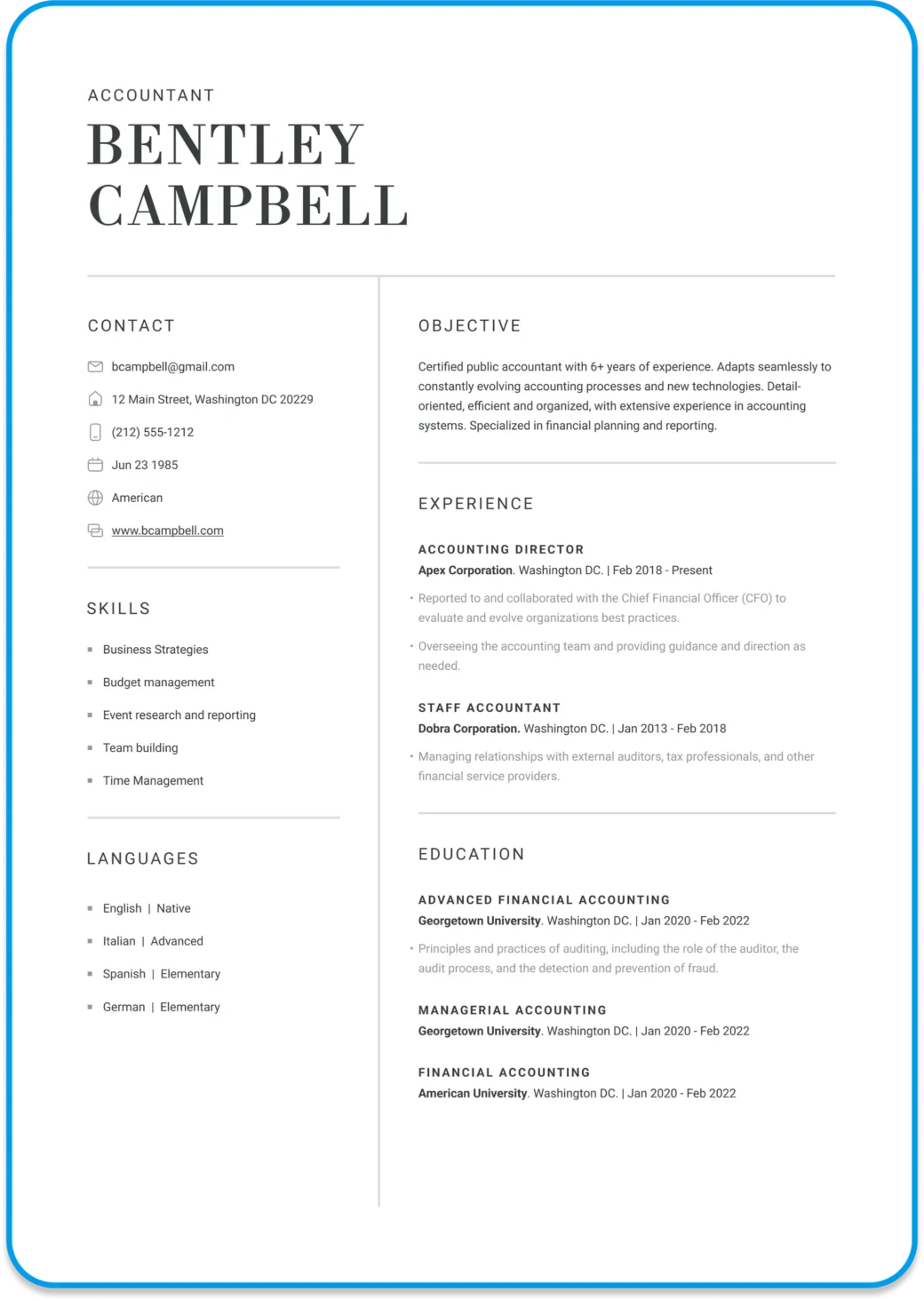
Create and edit your resume online
Generate compelling resumes with our AI resume builder and secure employment quickly.
Write a cover letter

Cover Letter Examples
Cover Letter Samples
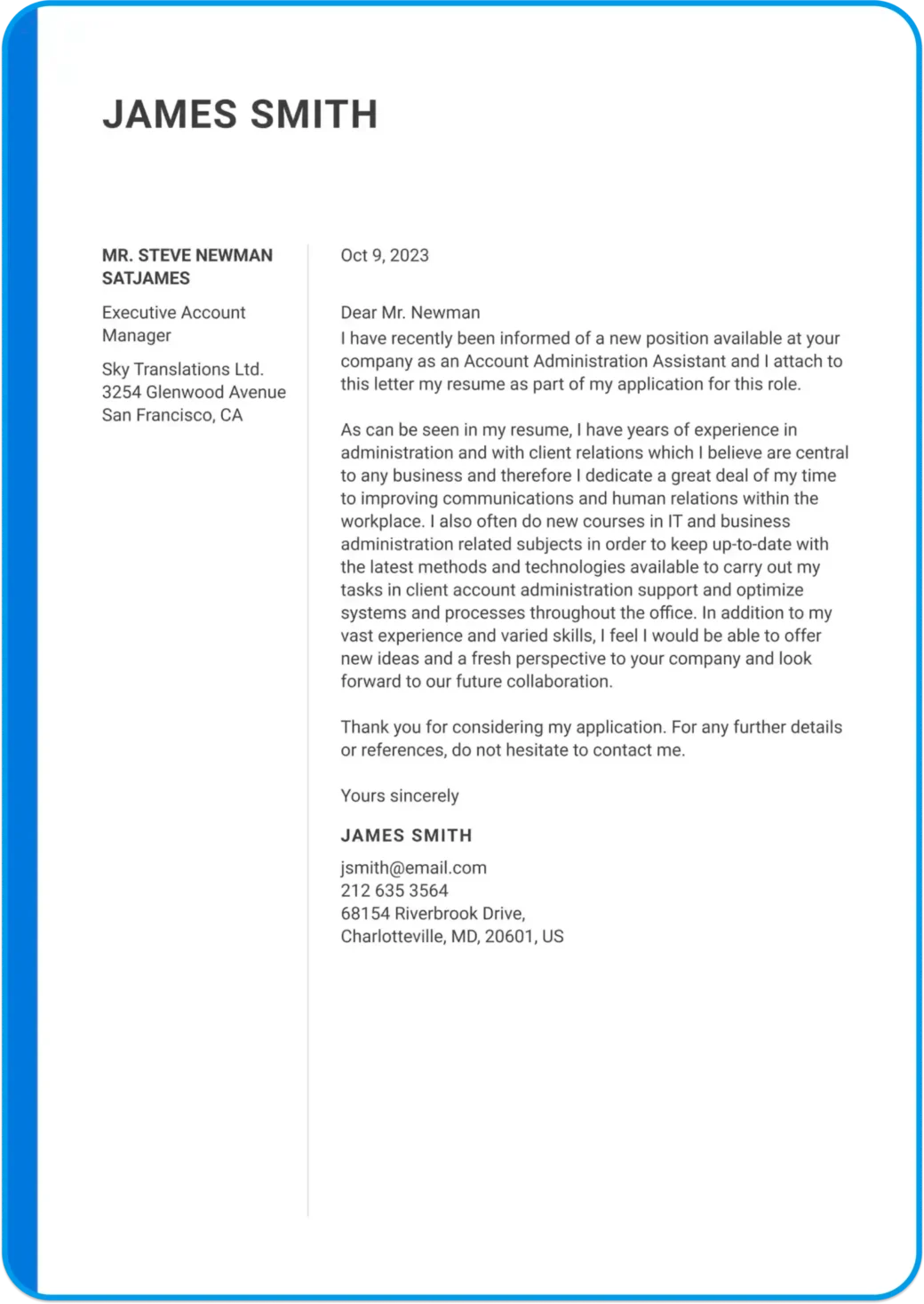
Create and edit your cover letter
Use our user-friendly tool to create the perfect cover letter.
Featured articles
- How to Write a Motivation Letter With Examples
- How to Write a Resume in 2024 That Gets Results
- Teamwork Skills on Your Resume: List and Examples
- What Are the Best Colors for Your Resume?
Latests articles
- Top 5 Tricks to Transform Your LinkedIn Profile With ChatGPT
- Using ChatGPT to Prepare for Interviews: Top Tips and Steps
- How to Create an Effective Cover Letter with ChatGPT
- 10 Jobs in High Demand in 2024: Salaries and Expected Growth

Dive Into Expert Guides to Enhance your Resume
Military to Civilian Resume Examples
Demilitarize your resume using our helpful tips

Military to Civilian Resume Samples
1. Candidate seeking security guard position
Army Veteran seeking to improve the safety of Township residents by providing security services to the Township Apartments.
- Oversaw 30 military police personnel
- Actively participated in the training of new personnel, including safety procedures
- Divided time between video surveillance and foot patrols
- Provided armed response to reported incidences and unusual activity
2. Candidate seeking position as restaurant manager
Passionate about food service and veteran-owned businesses, with the skills to manage supply logistics and day-to-day operations.
- Graduated with Honors
- Gained customer service skills as a retail associate that grew into communication and leadership skills during military service
- Responsible for supplying chain logistics
- Oversaw a group of 15 personnel
Military to Civilian Resume Vocabulary & Writing Tips
It is important to “demilitarize” the wording and vocabulary of your resume. Unless he or she has also served in the military, your civilian employer is unlikely to understand terms such as E-7, SNCO, or PCSing. When describing your duties, avoid military jargon and explain them in “layman’s terms.”
Read the job listing or description for the position to which you will apply. Look for keywords, and include them in your resume. This is important because many companies employ software that pre-screens resumes for key terms before it ever reaches a human reader.
The keywords you use will differ depending on the job you are seeking. Below, we’ve included a number of terms that are well suited to a wide array of resumes.
When you are finished writing your resume, proofread it carefully for any errors.
Words to Use
- Disciplined
- Fast learner
- Communication
- Group dynamic
- Veteran-owned
Action Verbs
- Communicate
Military to Civilian Resume Tips and Ideas
Transfering from military to civilian life is a challenge familiar to all veterans. Creating your resume and applying for civilian jobs is a battle you don’t have to fight alone. Our expert tips and professional resume examples can help you get started.
Your military experience has endowed you with numerous skills vital to the civilian workforce. Your resume should demonstrate these skills in an appealing format that is understandable to civilian employers.
Functional or combination formats are recommended
When designing your military to civilian resume, consider:
- Section Headings
- Organization
- Readability
- Contact information
- Resume summary
- Work history
- Language proficiency
- Certifications
- Honors and awards
Resume Length
Functional or combination resumes are recommended for a military to civilian transition , as these focus on your skills rather than your work history.
Begin your resume with a summary statement. This should be designed to catch your employer’s eye by citing skills he or she is looking for.
Next, build a skills or qualifications summary. This summary should demonstrate your skills in action. Don’t just state that you have a skill—show how you used it. Quantify your skills if possible. For example, rather than just listing “leadership,” quantify it by stating “directed a squadron of 30 personnel under combat conditions.”
Especially if you are using a combination resume format, list your work history and education in reverse chronological order.
You can utilize a standard resume design such as that demonstrated by most online resume templates . Your resume should be clean and neat in appearance. Begin each section with a clear heading. You can set your headings apart using bold or italic fonts. Select a standard font such as Arial at 11- or 12-point font. Leave plenty of white space around the text.
In the United States, it is not necessary to include your photo with your resume. If applying to a job while residing in another country, research common practices in that land. For example, you may be expected to submit a photo in some European countries .
Sections of a Military to Civilian Resume
Most resumes include the following sections:
Contact information will allow your employer to get in touch with you. The summary, skills, and history will give him or her a clear picture of your abilities.
Depending on your circumstances and the job to which you are applying, you may also include:
The ability to speak languages other than English can be a real asset in a diverse workplace or community. You may have attained various certifications during your service, such as CPR training or heavy equipment operation. These can also be valuable in civilian employment.
Finally, while your skills show what you can do, any honors or awards you have received show how well you can do it. You can even include pull-quotes from past reviews.
Your resume should be one to two pages in length , sized to fit 8.5 by 11-inch letter paper. If printing your resume, select a high quality, heavy weight resume paper.
Military to Civilian Resume Section Headings
Your skills and experience in the military can translate into just what your civilian employer needs . It is your job to tell them about your work and qualifications in a way that they will understand.
Skills are one of the most important aspects of your military to civilian resume. You will need to “translate” the language you use into that which can be easily understood by civilians. For example, you can demonstrate how you solved a problem under pressure without delving into the intricacies of military procedure.
What skills should you include? There may be many hard or technical skills , such as machine operation, computer programming, logistics, and the like. Also think about soft skills , including leadership ability, communication, and organization.
Remember that your employer is looking to hire someone that can solve a particular problem. Focus your skillset on qualities that will help you be that person. This may entail omitting irrelevant skills. For example, your marksmanship may be important if you are applying for a position as an armed security guard or as an instructor at a shooting range, but it is irrelevant if you are applying to an office job.
Work experience
A long military career may have endowed you with enough work experience to fill a biographical novel. For the sake of your resume, however, you’ll want to keep it brief. List only the last 10 to 12 years of experience , as this is considered the most relevant. Use your work descriptions to highlight skills that may transfer to your new job.

Struggling with Resume Writing?
Ease the process with our templates
Related Professions
Military Are you seeking to advance your military career? Put your resume through our resume boot camp, complete with expert advice and resume samples. Reviewed Updated on December 28, 2023 Military
- Cover Letters
- Jobs I've Applied To
- Saved Searches
- Subscriptions
- Marine Corps
- Coast Guard
- Space Force
- Military Podcasts
- Benefits Home
- Military Pay and Money
- Veteran Health Care
- VA eBenefits
- Veteran Job Search
- Military Skills Translator
- Upload Your Resume
- Veteran Employment Project
- Vet Friendly Employers
- Career Advice
- Military Life Home
- Military Trivia Game
- Veterans Day
- Spouse & Family
- Military History
- Discounts Home
- Featured Discounts
- Veterans Day Restaurant Discounts
- Electronics
- Join the Military Home
- Contact a Recruiter
- Military Fitness
From Military to Civilian: Resume Translation

You've served your country proudly, and now it's time to move on professionally. More than anything, you want your transition from boots to suits to be a smooth one. You want to land a good job that pays well. The only thing standing in your way? Your so-called resume.
Explaining to would-be employers what you did in the military in a way that makes sense to them can be difficult. Skills, experiences and accomplishments often get lost in translation or in the lack thereof. This is where the Military Skills Translator comes in, and you must decide what needs to be translated and what doesn't.
Related : Search for Veteran Jobs
To Translate or Not to Translate?
That is the question to answer before you start drafting your resume. Will you be sending it to someone within the defense industry? Or will you be targeting employers outside of it?
If the answer is yes to the former, then you may not need to spend a great deal of time translating your job titles, descriptions, awards and training into English.
Those within the defense industry usually understand what you are communicating, but not always. Keep in mind that a lot of people who work in the industry have never worn a uniform and may not fully understand what you've accomplished.
If you are targeting a job outside of the defense world, then you most certainly need to translate your skills , experiences and accomplishments into the English language.
It can be challenging but not impossible.
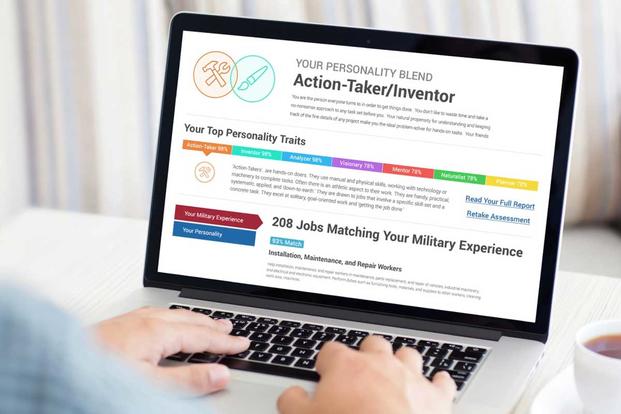
From a Tank to a Cubicle
"You have to be patient because there is no such thing as a perfect resume," said Philip Lapple, a former M1 main battle tank crewmember (19K-armor crewman) in the U.S. Army.
Lapple wants to switch career gears completely and get a job in business. To reach that goal, he is currently attending the University of Maryland, University College and working on a degree in management studies.
"I really don't think I will get a good job until I finish my degree, but I'm trying," Lapple said.
In the meantime, he is working on creating a basic master resume that he can tailor to individual job opportunities as they arise.
"On my resume, I try to show that I am a well-rounded package of education and expertise," said Lapple, adding that it continues to be a work in progress.
"You're not going to get it right the first time or the second time you write it," said Lapple, who finds himself revising his resume each time someone else critiques it for him.
Lapple understands he needs to translate specific words in order to make his resume work. Rather than say he was a tank crewmember, he says that he was a heavy equipment operator.
To highlight his skills without over emphasizing equipment operation, he puts strong emphasis on leadership.
"My latest version shows words like mentoring, efficiency, and workload planning. I also use the word "team" instead of platoon or squad," Lapple said.
"I am also physically counting and adding up the dollar value of items that I was in charge of in the military and noting the number of people or employees I supervised.
"Right now, school is my priority. In my case, I feel like my resume has to show not only practical experience but a degree as well," he said.

Staying in the Same Career Field
"I have a resume, but it's horrible. I want to make it better in order to be competitive," said Gary Heinstrom, a U.S. Army specialist who currently serves as a medic with the 554th Military Police Company based in Germany.
Heinstrom is knee deep in the process of transitioning out of the military. He is considering staying in his career field, but he wouldn't rule out getting his foot in the door to federal employment in any field, either.
"I just started the process of getting out, and there is so much information coming at me at one time. It's overwhelming, but it seems necessary at the same time," Heinstrom said.
If Heinstrom indeed tries to stay in the medical field, he may find that the level of translation needed for his resume differs from those needed by Lapple.
In some military career fields, such as those in the medical field, there may not be as strong a need to translate some of the skills, abilities and experiences for the civilian counterpart. In or out of uniform, patient care, recordkeeping and specific medical procedures and protocol are universally understood within the career field.
"Instead of saying that I was a medic, I am writing that I was a health-care specialist. I am also a certified emergency medical technician (EMT), and that is the same in or out of the military," Heinstrom said.
Heinstrom said he is also making it a point to quantify his accomplishments and avoid the use of personal pronouns.

For More Assistance
Translating the military words on your resume into civilian ones can be challenging. You don't have to do it alone, though.
Visit your transition assistance office or the family services and support center's employment readiness program. On either doorstep, you'll find expert, one-on-one counseling assistance or available classes, free of charge.
For your own research, the following websites offer excellent military-to-civilian translation tools:
- Military to Civilian Skills Translator
- O*Net Military Crosswalk
- FREE Resume Assessment Service
You can also get ideas on how to translate your military experiences effectively by looking at the civilian job descriptions or vacancy announcements for the jobs that interest you.
Here are some word-for-word common translation examples:
- Commander = director or senior manager
- Executive officer = deputy director
- Field grade officer = executive or manager
- Company grade officer = operations manager or section manager
- Warrant officer = technical specialist or department manager
- Senior NCOs = first-line supervisor
- Infantry = security force
- First sergeant = personnel manager
- Squad leader = team leader or team chief
- Supply sergeant = supply manager or logistics manager
- Operations NCO = operations supervisor
General Terms
- AI = additionally skilled in
- Combat = hazardous conditions
- Company = company, department or section
- Medal = award
- Military personnel office = human resources
- Mission = task, function, objective
- Military occupation specialty, classification = career specialty
- Squad, platoon = team or section
- Reconnaissance = data collection and analysis
- Regulations = policy or guidelines
- Security clearance = security clearance
- Service members = employees
- Subordinates = employees
- TAD/TDY = business trip
Related Articles:
- Writing Military-to-Civilian Resumes: Make Your Resume Interviewable
- Sample Resume for a Military-to-Civilian Transition
- Translating Your Military Resume for a Corporate Audience
- 20 Tips to Make Your Resume Stand Out
For the latest veteran jobs postings around the country, visit the Military.com Job Search section .
The Next Step: Find the Right Veteran Job
Ready to polish your resume, and connect with employers looking to hire veterans? Military.com can help. Sign up for a free Military.com membership to have job postings, career fair listings, guides and advice, and more delivered directly to your inbox.
You May Also Like
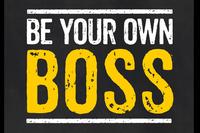
Leadership skills can be wasted on a traditional job hunt. Find out how your leadership skills can help you be your own boss...
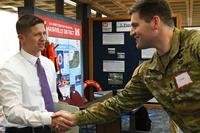
Just because you know how to perform a job, have the credentials to do certain work or are skilled in an area doesn't mean it...

After being a Navy SEAL, becoming an officer, then going to Harvard Medical School and now becoming an astronaut, what other...

Amid calls of "defund the police," Special Forces veteran Michael Cutone is showing the country a better way forward.

- Job Hunting
- Military Transition

Get the Veteran Jobs Newsletter
Get special job alerts, offers and insider tips on making the most of your military experience in the civilian workforce.
View more newsletters on our Subscriptions page.
Verify your free subscription by following the instructions in the email sent to:
Select Service
- National Guard
Featured Veteran Employer
Veteran jobs.
- Veteran Jobs Home
- Transition Center
- Security Clearance Jobs
- Upcoming Job Fairs
- For Employers
The Veteran Employment Manual

Find Veteran-Friendly Jobs
Search the largest free Veteran Job board to find jobs with veteran-friendly companies.
Hot Career Advice
- Master Class: What Happens to Leadership When You Leave the Military?
- You Can, But Should You? 9 Questions to Ask Yourself When Choosing a Post-Military Career Path
- A Former Green Beret Has a Real Solution to the US Policing Problem
Resume Advice
Veteran job search tools.
- Get a FREE Resume Assessment
- Military Transition Center
- Employers Hiring Veterans
Top Industries for Veterans
- Security Clearance
- Law Enforcement
- Maintenance
- Healthcare & Nursing
- Teaching & Education
- Transportation
Protect your data
This site uses cookies and related technologies for site operation, and analytics as described in our Privacy Policy . You may choose to consent to our use of these technologies, reject non-essential technologies, or further manage your preferences.
Military to Civilian Resume Sample: Logistics & Management
Making the initial transition from a military career to a civilian one can seem like a challenge. However with the right tools by your side - such as a professionally written resume and cover letter that showcase your strengths, skills and accomplishments - you can set yourself up for success.
Logistics is a common industry for military veterans, usually because military careers often include technical trainings that can later be used for a career in logistics or a similar field. A quick search for logistics jobs or other similar positions can reveal the high demand for professionals in this field. Some of the positions in this field include project management, dispatching, transportation, warehouse careers and more.
Another popular field for those making the military to civilian transition is management. There are so many industries that utilize management positions – from administrative services and advertising to information technology and construction industries, the possibilities are almost endless. As a former military member, however, it’s important that your resume adequately reflects your strengths, skills and experiences in a way that answers the common question employers ask: how does hiring you benefit us?
If you’ve chosen to move into the logistics or management field after your career in the military, you’re already on the right path. Now, seeing other military to civilian resume samples can show you the best way to get your foot in the door of the logistics or management industry.
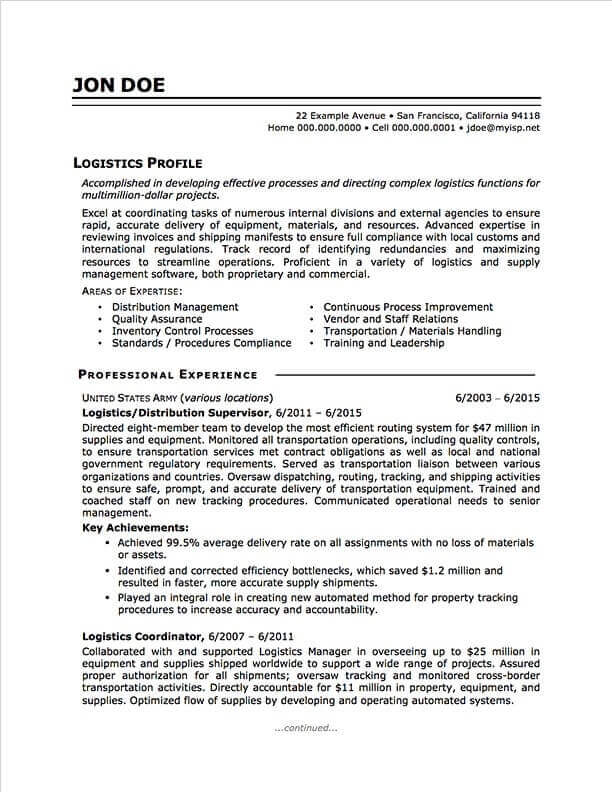
What Makes this Resume Work?
The above military to civilian resume sample works because:
- It's says what's in it for the employer. It's easy to talk about your strengths, skills, and past accomplishments, but how does that benefit the company for which you're applying? Your resume should show how you positively impacted your previous employers, whether through company growth, team success, project results or other accomplishments –not just list your job duties.
- It uses quantitative information. Not only are numbers concise and easy to digest, the human mind naturally responds better to numbers compared to words. Rather than using words to describe your achievements, use numbers and symbols when creating a resume.
- It uses clear section headings. When deciding how to format a resume, remember that these headings must be definitive and must stand out amidst the other text in the document. Don't be afraid to use a shaded box, bold text, and white-space around each heading.
- It's simple. It's not about what you think looks pretty or guessing what the company wants from you. A resume is about telling the company what you can do for it. Your accomplishments matter, not the font or fancy resume layout.
Making the transition from a military career to a civilian one doesn't have to be difficult. The first step is a great resume that lands you an interview. TopResume offers three levels of resume writing services with all of the components you need to make your job application the best it can be. We guarantee you'll get 2x more job interviews within 60 days or we'll rewrite your resume for free.
Turn your resume into the helpful tool it's designed to be. Use our resume writing service today!
Samples by Category
- Administrative Office Assistant
- Advertising & Marketing
- Construction Contractor
- Customer Service
- Executive Assistant
- Executive/CEO
- Graphic Designer
- Industrial Engineer
- Insurance Agent
- Information Technology
- Mid-Career Professional
- Military-to-Civilian
- Nurse Practitioner
- Nursing (Healthcare)
- Public Relations
- Real Estate Management
- Retail Merchandising
- Safety Management
- Sales Management
- Student (or Recent Graduate)
- Teacher / Professor / Librarian
- Telecommunications
Ready to rewrite your resume?
Want a free resume analysis?
Get the information you need to land your dream job faster – delivered to your inbox, every week.
Thanks! Career advice is on its way.
- Recruitment Process Outsourcing
- Military Search
- HirePurpose® Diversity Sourcing
- HirePurpose® Military Sourcing
- HireSkills® Workforce Partnerships
- Industries We Serve
- Employer Resources ▼
- Recruiting Resources
- Search Jobs
- Military & Veteran Job Seekers ▼
- Search Jobs for Military Veterans
- HirePurpose® Military Jobs
- Veteran & Military Services
- Resources for Military ▼
- Military Resources Overview
- Hiring Conferences
- Interview Essentials
- The Hunter Newsletter
- Testimonials
- HirePurpose® Diversity Jobs ▼
- HirePurpose Careers
- Diversity Job Search
- Diversity Job Alerts
- Join Our Team ▼
- Careers At Orion
- DOD Skillbridge Internships
- Recruiter Development Program
- Diversity, Equity & Inclusion
- About Orion
- Our Partners
- Mission & Values
- Employer Blog
- Job Seeker Blog
- Battlefield to the Boardroom® Podcast
- #People with Purpose Podcast
- Job Seeker Log-In
- Military Transition Resources
- How to Create a Military to Civilian Resume
- Sample Military Resumes
Military to Civilian Resume Samples
Sample military to civilian resumes for junior military officers (jmos), noncommissioned officers (ncos) and enlisted technicians.
These resume samples are intended to give you an idea of what your resume may look like using the Chronological and Skills Based/Combination formats. Consult with your Candidate Recruiter for specific resume preparation assistance and advice.
Please remember to use Microsoft Word format, and do not use tables, headers, or footers.
Chronological Format Sample Resume
The Chronological Resume format is the most widely used. Hiring Managers are used to seeing it, and this format makes it easy for them to scan your resume and see at a glance if you're a good fit for the position. A Chronological Resume is the best way to explain your background and skills.
Skills Based/Combination Format Sample Resume
The Skills Based/Combination Resume format places equal emphasis both on your skills and work experience. It allows you to present a quick overview of your actual employment history and the areas that are transferable. If you have a limited work history, or the history you do have isn't directly related to the job you're applying for, a Skills Based/Combination Resume format is good to use.
Junior Military Officer Sample Resume
If you are a Junior Military Officer with limited to no civilian work experience, this resume helps to highlight your military experience and focus on your skill set. The best rule of thumb for this type of resume is to avoid military jargon and to include results and achievements during your time in the service.
Machinist Mate Sample Resume
For specialized positions like the Navy Machinist’s Mate, the resume will look very similar to the Military Technician resume. You will want to draw attention to your areas of expertise within your military role. This will help to focus on the skills that you have obtained while in service. Be sure to also list out any certifications or additional education related to your field.
Technician Sample Resume
If you are a Military Technician with limited to no civilian work experience, this resume helps to highlight your areas of expertise within your military experience while focusing on your skill set. For this resume, focus on your proficiencies and expound upon any troubleshooting experience and certifications that you have received.

- Engineering
- Manufacturing Management
- Leadership Development Programs

Orion Talent helps you fill 1 or 100,000 roles with the right people and the right solution, so you can build a winning team - today and into the future. We power all your talent needs through our diversity rich network of highly sought-after candidates, including an engaged community of veterans and military personnel.
- Careers with Orion ➔
- About Orion ➔
- News + Press ➔
- Website Search ➔

- Terms of Use
- Privacy Policy
- Linking Policy
- Website Feedback

- Subscribe Now (Opens in new window)
- Air Force Times (Opens in new window)
- Army Times (Opens in new window)
- Marine Corps Times (Opens in new window)
- Pentagon & Congress
- Defense News (Opens in new window)
- Flashpoints
- Benefits Guide (Opens in new window)
- Military Pay Center
- Military Retirement
- Military Benefits
- VA Loan Center (Opens in new window)
- Discount Depot
- GearScout (Opens in new window)
- Military Culture
- Military Fitness
- Military Movies & Video Games
- Military Sports
- Transition Guide (Opens in new window)
- Pay It Forward (Opens in new window)
- Military History
- Black Military History (Opens in new window)
- Congressional Veterans Caucus (Opens in new window)
- Military Appreciation Month (Opens in new window)
- Vietnam Vets & Rolling Thunder (Opens in new window)
- Hall of Valor (Opens in new window)
- Service Members of the Year (Opens in new window)
- Create an Obituary (Opens in new window)
- Medals & Misfires
- Installation Guide (Opens in new window)
- Battle Bracket
- CFC Givers Guide
- Task Force Violent
- Newsletters (Opens in new window)
- Early Bird Brief
- Photo Galleries
- Long-Term Care Partners
- Navy Federal
- Digital Edition (Opens in new window)
Transition Guide
How to find a civilian career after leaving the military.
Lisa Elswick’s boss at United Service Organizations was an Air Force veteran of 26 years when he retired from his distinguished military career, ready to take on a new challenge in civilian life.
There were only a few wrinkles in his plan.
“When he retired, he had never interviewed for a job,” said Elswick, the vice president of transition programs for the USO. “He didn’t have a resume. He never wore a suit. It’s things that those of us that have lived in the civilian world all of our lives take for granted. It’s just part of the process.”
“What’s next?” and “How should I proceed?” are common feelings shared by many veterans, regardless of their age and experience while in the military. Service members spend their time in the military following orders, having many decisions made for them. When that comes to an end, veterans must make an important decision: what they want in a civilian career, if they don’t intend to go to school.
Many veterans will pursue a career that highlights their military experience, like medics pursuing an occupation in healthcare, or pilots working for an airline.
“But if you’re an infantryman, what are you going to do?” Elswick said.
Veterans should consider the answer before separating from the military, and develop a plan to pursue that goal. Organizations like the USO and Hire Heroes are ready to help service members with that transition. Another group, Veterans Transition Support, offers free career-training programs that help veterans with coaching to search for jobs, writing resumes and cover letters and how to prepare for interviews.
VTS volunteers like veteran Merlyn Cruz-Feliciano, who have gone through the same change, can relate to the struggles others can experience when in the job market.
“I loved my job as a logistician when I was in the military,” she said. “I was very good at it, but I just knew in my heart that was not what I wanted to do. Unfortunately, a lot of veterans kind of stick with what they know.”
Cruz-Feliciano eventually decided to pursue a masters degree in mental health therapy.
For veterans who want to enter the workforce, getting the guidance needed to help find the right career is critical. The next — and maybe most important — step is showing a veteran how to market their skills by building an impressive resume tailored to the job they want.
“Translating military skills to a civilian resume is a major, major struggle,” Elswick said. The USO also offers interview preparation, including a website that uses artificial intelligence to give real-time feedback.
For veterans unsure of what career they want, Elswick said trending jobs include government contracting, cybersecurity, health care and law enforcement.
“Federal resumes are very different from civilian resumes, and you need a very specialized skill set to get it through their applicant tracking system,” Elswick said.
In addition to constructing a solid resume, veterans should set up a LinkedIn account to connect with peers and companies that are looking to hire. Indeed is another popular site for seeking out available jobs. Another resource for veterans is Military Friendly Employers, which lists more than 1,500 organizations that are designated as military-friendly businesses.
Veterans may consider pursuing certifications that could help their military skills transfer to the civilian world as well. Participating in a Skillbridge program, a fellowship that can act as an off-ramp between military and civilian employment, is another option as well. And seeking out mentors who can offer advice for navigating the job hunt and interview processes, plus daily life in the civilian workforce, can be invaluable.
“There are actually jobs everywhere,” Elswick said. “But how do we prepare our veterans to enter the civilian workforce?”
In Other News
Navy IDs sailor who died during Middle East deployment
Chief hospital corpsman daniel d. mccracken died during a non-combat related incident on may 6..
VA to provide grants for veteran, spouse employment help
A new grant program will provide up to $500,000 to organizations helping veterans and spouses land post-military jobs..
Navy offering big bucks to keep aviation officers in uniform
Aviators from a variety of platforms are eligible for big bucks if they opt to stay navy..
Watchdog blasts VA for errors leading to $11M in improper bonuses
A watchdog report criticized va leaders for mistakes in handling $11 million in bonuses for senior department leaders..
Marine Corps’ longest-held Vietnam War POW, Harlan Chapman, dies at 89
Marine aviator harlan chapman once spent 2,657 days in captivity before his release in 1973. the retired lieutenant colonel passed away monday, may 6..
- 800-977-8449
- Request Info

Military Transition Resources for Entering the Civilian Workforce

Share this article
Posted on May 7, 2024
In a Pew Research Center study, 95% of veteran respondents answered that they looked for a job after leaving the military. It’s a common challenge, and there are plenty of resources available to help veterans make the transition, but it may feel overwhelming.
Finding the tools and programs that are the best fit for you is a good first step when preparing for your transition. In this article, we’ve compiled some of the most helpful resources for veterans entering the civilian workforce .
VA Resources
A good place for veterans to start is the Transition Assistance Program (TAP) offered by the Department of Veterans Affairs. Service members can begin the program one year prior to separation or two years prior to retirement. TAP participants receive information, resources and tools to help them and their loved ones prepare for the move to civilian life . To listen to stories from veterans who have benefited from TAP, view the following video produced by the VA.
The VA also offers its Personal Career Planning and Guidance (PCPG) program through Chapter 36 . If you're leaving active service soon or have been discharged within the past year – or you’re any veteran or dependent who qualifies for VA education benefits – you can receive counseling to help you decide on a career or training program and overcome any issues that may get in your way. The following video details the VA’s Chapter 36 services.
Related: Take Advantage of VA Career Counseling to Make the Most of Your Military Benefits
State Resources
Another potential source of helpful information for your area may be your state labor office. For example, the Alabama Department of Labor website posts job listings and information about training programs and career centers throughout the state.
Contact information for each state labor office is available on the U.S. Department of Labor website .
Personal and Professional Relationships
When it comes to transitioning into civilian life, both personal and professional connections are valuable. Think about the relationships you’ve built throughout your life – family members, college friends and instructors, fellow military service members, and more – and how those people may be able to help guide you in the right direction.
If someone helped you by reviewing your resume, connecting you with a hiring official at a company, or anything else, find a way to thank them. Then, when someone asks you for something similar, pay it forward.
Related: The Importance of Mentors for Veterans in College
University Resources
Finally, if you’re already a college student or graduate, you probably have access to a university career services team. In some cases, career services professionals at your school may have the exact knowledge or connections that you need to get your foot in the door in your industry. Many universities also offer resources developed specifically for the unique challenges faced by military-affiliated students.
Here at Columbia Southern University, our dedicated military support staff is comprised of current and former military members who understand your unique needs. Whether you pursue a military studies degree – offered by our recently-launched College of Military Studies and Leadership – or another of our popular degrees, our Veterans Center is available to work with you to help you get the most out of your education.
For more information about our online degree programs at the associate, bachelor’s, master’s and doctoral levels, visit our website .
Multiple factors, including prior experience, geography, and degree field, affect career outcomes. CSU does not guarantee a job, promotion, salary increase, eligibility for a position, or other career growth.
Any reference to United States Department of Defense (DoD) personnel, products or services does not constitute or imply endorsement by the DoD. Paid ad. No federal endorsement of advertiser(s) intended.
Topics in This Article
- Career Planning
Related Articles

Category: Military Support
The Importance of Mentors for Veterans in College

Take Advantage of VA Career Counseling to Make the Most of Your Military Benefits

7 Steps for Transitioning From Military to Civilian Employment
Request more information.
Ready for more information about Columbia Southern University? Fill out the form here to be connected with an admissions counselor and learn more about:
- Online degree programs.
- Transfer credits.
- Enrollment options.
- Tuition and payment.

First Step Program Details
All fields are required
Second Step Contact Information
Final step additional details.
Are you active military, veteran or retired from the U.S. military?
Columbia Southern University utilizes various forms of automated technology communication with students. For quality purposes, CSU may monitor and/or record these communications. By submitting this request, students and/or their representatives are consenting to monitoring and/or recording of such communications to include, but not limited to, phone, email, and text messaging. You give Columbia Southern University and/or Columbia Southern Education Group consent to call, text and email you at the information above, including your wireless number if provided, regarding educational services. You may still choose to enroll in the university if you do not provide consent.
Thank you for your interest
Your information has been sent and we will contact you soon.

IMAGES
COMMENTS
Learn how to write a compelling military to civilian resume with a functional format, key strengths, achievements, and optional sections. Browse free templates and get job-search resources for veterans.
A strong history of overseeing multi-million-dollar supply chains to support military operations. 2. Add a compelling section featuring your military-to-civilian experience. To grab the hiring manager's attention, you want to create compelling bullet points that showcase your strongest and most relevant accomplishments.
Learn how to convert your military skills and experience into a civilian resume that will stand out. Find tips, tools and examples to help you write a resume that highlights your qualifications and accomplishments.
Here's a template you can use to write a military-to-civilian resume: Download Resume Template. To upload the template into Google Docs, go to File > Open > and select the correct downloaded file. See your instant resume report on Indeed. Get recommendations for your resume in minutes.
Here's another military resume example: Security Specialist - U.S. Marine Corps 2008 to 2011. Led and mentored a diverse team of 25 people, attaining a 5% increase in promotions and 20% decrease in turnovers. Received recognition for reporting and documentation accuracy.
Learn how to write a military to civilian resume with tips and examples. See how to translate your military skills and experience to civilian jobs and stand out from other applicants.
Here are three tips any MOS, NEC, or AFSC should keep in mind when writing a military-to-civilian resume. Examples will be listed throughout the text to give you a rough idea of what to write about (even if your industry isn't listed). 1. Plan your career path before being discharged.
Our military to civilian resume template is designed to highlight your accomplishments and transferable skills in a clear and concise manner. It is formatted to be easily scannable by hiring managers and ATS systems. The template includes the following sections: Contact Information. Objective Statement.
Military-to-civilian resume example William Smith 555 Liberty Way Portland, OR 97035 555-555-5555 [email protected] Summary Aircraft mechanic and crew leader with 10 years of experience leading teams of up to 6 technicians to maintain all aircraft systems of multiple airframes. Dedicated to efficiently balancing productivity, quality and safety to ensure customer needs are met.
Top 5 Tips for Your Military to Civilian Resume. Highlight leadership and adaptability. Showcase the leadership skills you gained in the military, emphasizing flexibility and resilience. This shows recruiters your capacity to thrive in high-pressure environments, which is necessary in many jobs. Quantify achievements with metrics.
The VMET is a thorough document outlining your entire military career and it will include an equivalent to use in your resume. For example: Dates: June 2021 - Present (2 years 8 months) Organization: US Army, 1st Infantry Division, 2nd Brigade Combat Team, Alpha Company. Location: Fort Hood, TX.
Like a civilian resume, your military-to-civilian resume will include the following information: Contact information. Work experience. Education. Skills. Certifications. There are also other items you can include on this resume, if space allows, such as: Resume summary. Clearances.
5 Tips for Writing a Strong Veteran Resume. 1. Translate your background into civilian terms. Unfortunately, the terms used in the armed forces are not quite straightforward for the average layperson. For hiring managers with little to no familiarity with the military, titles like "Heavy Signal Platoon Leader" and "Expeditionary Signal ...
Other key skills that might prove effective on a military to civilian resume are: Leadership. Analytical. Problem-solving. Risk management. Critical thinking. Detail oriented. Team player. Align the skills you built during your military service to those being sought for a particular position.
Learn how to write a resume that showcases your military skills and experience for civilian jobs. See resume samples for different career paths and get tips on formatting, grammar, and terminology.
Learn how to write a military-to-civilian resume that showcases your skills and experience in a way that makes sense to civilian recruiters and hiring managers. Get tips on how to demilitarize your language, consult your documentation, and tailor your resume to the job description.
Resume Length. 1-2 pages. Format. Functional or combination resumes are recommended for a military to civilian transition, as these focus on your skills rather than your work history.. Begin your resume with a summary statement. This should be designed to catch your employer's eye by citing skills he or she is looking for.. Next, build a skills or qualifications summary.
17 N. Ridgeview, Apt. #472. Sometown, CA 90000. (555) 555-5555. [email protected]. Profile. Decorated police officer transitioning from the U.S. Marine Corps Military Police (MP) to civilian ...
FREE Resume Assessment Service. You can also get ideas on how to translate your military experiences effectively by looking at the civilian job descriptions or vacancy announcements for the jobs ...
2. Make sure to include soft skills in your military-to-civilian resume, for example, your management skills and your strong leadership strategies. 3. Your mission for the skills section is to choose quality over quantity. Include only the most relevant ones that suit the corporate job.
Making the transition from a military career to a civilian one doesn't have to be difficult. The first step is a great resume that lands you an interview. TopResume offers three levels of resume writing services with all of the components you need to make your job application the best it can be. We guarantee you'll get 2x more job interviews ...
Sample Military to Civilian Resumes for Junior Military Officers (JMOs), Noncommissioned Officers (NCOs) and Enlisted Technicians. These resume samples are intended to give you an idea of what your resume may look like using the Chronological and Skills Based/Combination formats. Consult with your Candidate Recruiter for specific resume ...
Use the federal agency's online resume builder. Copy and paste sections from your master resume into the online resume builder website of the federal agency that you are applying to. You can also create a hard copy of your resume if a federal agency requires one. Choose your words carefully. Human resources staff, or a computer program, will ...
"Translating military skills to a civilian resume is a major, major struggle," Elswick said. The USO also offers interview preparation, including a website that uses artificial intelligence to ...
Military transition resources are available for veterans entering the civilian workforce. In this article, we've compiled ideas to help you start. 800-977-8449; Request Info; ... If someone helped you by reviewing your resume, connecting you with a hiring official at a company, or anything else, find a way to thank them. Then, when someone ...